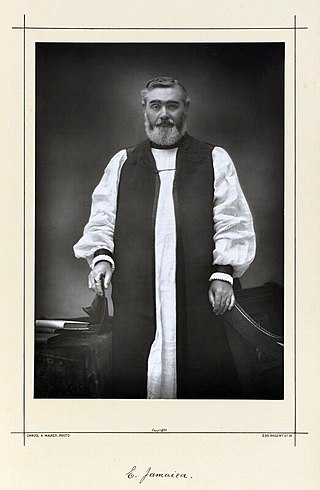Related Research Articles
Admiral The Hon. George Townshend was a British naval commander.

Enos Nuttall was the Anglican Primate of the Church in the Province of the West Indies, elected as such in 1892.

Admiral Sir Charles Rowley was a Royal Navy officer who went on to be Commander-in-Chief, Portsmouth.
The National Library of Jamaica is the national library of Jamaica. It is located at 12 East Street in Kingston, Jamaica. The library provides access to various collection of Jamaican literature, maps, films, newspapers, photographs, and more.

The House of Assembly was the legislature of the British colony of Jamaica. It held its first meeting on 20 January 1664 at Spanish Town. As a result of the Morant Bay rebellion, the Assembly voted to abolish self-governance in 1865. Jamaica then became a direct-ruled crown colony.

The Jamaica Station was a formation or command of the United Kingdom's Royal Navy stationed at Port Royal in Jamaica from 1655 to 1830.
Vice-Admiral John Pakenham (1743–1807) was a Royal Navy officer who became Commander-in-Chief of the Jamaica Station.

Vice-Admiral Thomas Davers was a Royal Navy officer who served as Commander-in-Chief of the Jamaica Station.
Captain Digby Dent (1682–1737) was a Royal Navy officer who served as Commander-in-Chief of the Jamaica Station.
Rear Admiral William Smith was a Royal Navy officer who served as Commander-in-Chief of the Jamaica Station.
Vice Admiral James Littleton (1668–1723) was a Royal Navy officer who served as Commander-in-Chief of the Jamaica Station.

The Handbook of Jamaica was an official government handbook of Jamaica first published in 1881 and which continued until the 1950s.
Richard Hill (1795–1872), was a Jamaican lawyer and leader of the free people of colour, when they campaigned for equal rights in the early nineteenth century. In addition to his legal practice, Hill was also a naturalist, a poet, and an educator, as well as an administrator.

Frank Cundall was an English art historian, editor and author, the son of the writer and publisher Joseph Cundall. He was closely involved in the administration of and produced the reports for a series of international exhibitions held in London in the 1880s, and catalogued the art library at the South Kensington Museum, later the Victoria and Albert Museum.
William Nedham was the speaker of the House of Assembly of Jamaica in 1718, 1722, and 1733.
Robert Noell was Chief Justice of Jamaica in 1688.
John Henckel was Chief Justice of Jamaica in 1801.
Sir Joshua Rowe was Chief Justice of Jamaica from 1832 to c. 1856.
Sir Bryan Edwards was Chief Justice of Jamaica in 1855.

The Weekly Jamaica Courant, published as The Weekly Jamaica Courant, with News Foreign and Domestick, was the first newspaper published in colonial Jamaica and the West Indies, and the second regular newspaper in the British settlements of the New World. It was first published in 1718 and was disestablished in 1755, being succeeded or replaced by the Jamaica Gazette or the St. Jago de la Vega Gazette.
References
- 1 2 Frank Cundall (1858 - 1937). National Library of Jamaica. Retrieved 26 April 2019.